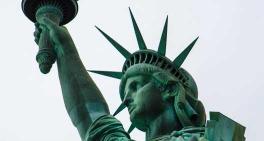New voter ID law immediately challenged in N Carolina court
Featured Articles
The North Carolina law detailing a new voter photo identification requirement got challenged in court Wednesday mere moments after the Republican-led General Assembly completed the override of Democratic Gov. Roy Cooper's veto of the measure.
Six voters filed the lawsuit in Wake County court less than 15 minutes after the state House finished the override in a mostly party-line 72-40 vote. The Senate already voted to override Tuesday.
The photo ID law implements a constitutional amendment approved in a referendum last month that mandates photo identification to vote in person, with exceptions allowed. Still, the plaintiffs contend the law violates the state constitution and should be blocked, saying it retains requirements within a 2013 photo ID law that federal judges struck down.
The voters — five black residents and one described as biracial — say the restrictions will harm African-American and American Indian residents disproportionately and unduly burden the right to vote. It also creates a financial cost to voting in the form of lost work times and the need to secure transportation to obtain an ID, the lawsuit said.
"The General Assembly has simply reproduced the court-identified racially discriminatory intent it manifested a mere five years ago when it enacted a very similar voter ID requirement," according to the plaintiffs' lawyers. Some of the attorneys work for an organization that helped challenge the 2013 law. That litigation took nearly four years to resolve.
Before and after the lawsuit was filed Wednesday, Republican lawmakers said the implementing legislation carries out what 55 percent of voters who supported the referendum in November wanted. GOP legislators rejected Cooper's veto message that the bill was a "sinister and cynical" attempt to suppress the voting rights of minorities, the poor and the elderly. Rather, they said, it was designed to discourage voter fraud and increase the public's confidence in elections.
Related listings
-
Supreme Court to hear closely watched double jeopardy case
Featured Articles 12/07/2018The Supreme Court is set to hear arguments about an exception to the Constitution's ban on being tried for the same offense. The outcome could have a spillover effect on the investigation into Russian meddling in the 2016 election.The justices are ta...
-
Supreme Court sets high bar for medical device lawsuits
Featured Articles 11/27/2018The tiny balloon was supposed to stretch open a blocked artery on Charles Riegel's diseased heart. Instead, when the doctor inflated the balloon, it burst.The patient went on life support but survived. His lawsuit against the manufacturer of that art...
-
European court orders Turkey to free ex-Kurdish party leader
Featured Articles 11/20/2018The European Court of Human Rights on Tuesday called on Turkey to release the former head of Turkey's pro-Kurdish opposition from detention. Turkey's president responded by claiming his country was not bound by the court's rulings.In its ruling on Tu...

USCIS Issues Clarifying Guidance on NAFTA TN Status Eligibility for Economists
U.S. Citizenship and Immigration Services (USCIS) announced today that it is clarifying policy guidance (PDF, 71 KB) on the specific work activities its officers should consider when determining whether an individual qualifies for TN nonimmigrant status as an economist.
The North American Free Trade Agreement (NAFTA) TN nonimmigrant status allows qualified Canadian and Mexican citizens to temporarily enter the U.S. to engage in specific professional activities, including the occupation of economist. The agreement, however, does not define the term economist, resulting in inconsistent decisions on whether certain analysts and financial professionals qualify for TN status as economists.
TN nonimmigrant status is intended to allow a limited number of professionals and specialists to work temporarily in certain specifically identified occupations in the United States. This updated guidance provides USCIS officers with a specific definition of one such category – economists – allowing them to adjudicate applications in a way that complies with the intent of the agreement. This policy update clarifies that professional economists requesting TN status must engage primarily in activities consistent with the profession of an economist. Individuals who work primarily in other occupations related to the field of economics — such as financial analysts, marketing analysts, and market research analysts — are not eligible for classification as a TN economist.




